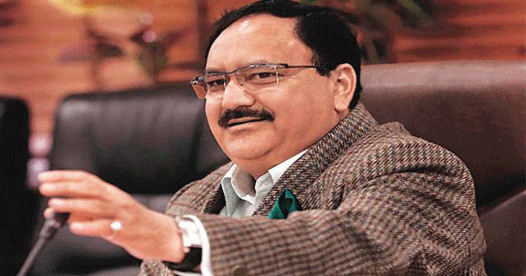
Union Minister of Health and Family Welfare J P Nadda has been conferred the WHO Director-General’s Special Recognition Award for global tobacco control.
The award was presented to him by Dr Poonam Khetrapal Singh, Regional Director, WHO South-East Asia at the ‘National Consultation on Accelerating Implementation of WHO Framework Convention on Tobacco Control (FCTC) for achievement of SDGs’.
Indian Scenario
India is the second largest tobacco consuming country in the world with 27 crore users.
The government has initiated various measures to reduce tobacco consumption in the country.
These include large pack warnings with 85% pictorial health warnings on both the sides, launching of toll-free national tobacco Quitline and mCessation services, carrying out second round of Global Adult Tobacco Survey (GATS), increase in investment under the 12th Five Year Plan for expansion of National Tobacco Control Programme, which was recognized by WHO as a best practice in its Global Tobacco Control report, 2015.
Apart from the above measures health ministry has also put a ban on smokeless tobacco products and works towards strengthening Tobacco Free film and television policy.
As a result of various measures taken by the government, NGOs and civil society organizations, the tobacco use in the country is estimated to have reduced by 81 lakhs and youth consumption of tobacco has also seen marked decrease.
A 54% relative reduction in prevalence of tobacco use among minors (15-17 years) and 28% reduction in the age group of 18-24 years has been reported.
WHO Framework Convention on Tobacco Control (FCTC)
The FCTC is the first international public health treaty negotiated under the auspices of WHO.
It was adopted by the World Health Assembly on 21 May 2003 and subsequently entered into force on 27 February 2005.
It provides a new legal dimension for international cooperation in healthcare in combating the tobacco epidemic.
It has successfully helped to co-ordinate and energize the global struggle against tobacco.
It is considered as one of the most widely embraced treaties in the history of WHO and UN.
It is an evidence-based treaty that reaffirms the right of all people to the highest standard of health and was developed in response to globalization of tobacco epidemic.
Under it, the Protocol to Eliminate Illicit Trade in Tobacco Products was adopted to address the increasing illegal trade in tobacco products in November 2012.
Current Affairs 8th June, 2017
Current Affairs One Liners 6 June, 2017
Current Affairs Round Up Bullet Points, May, 2017

Join The Discussion